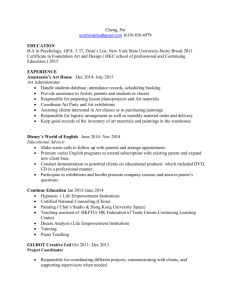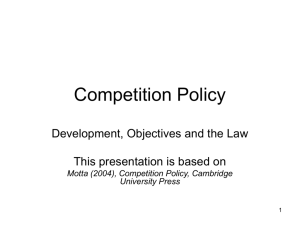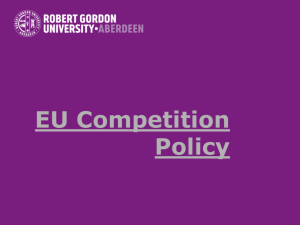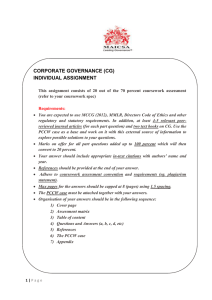PCCW has previously indicated its support for a general competition
advertisement
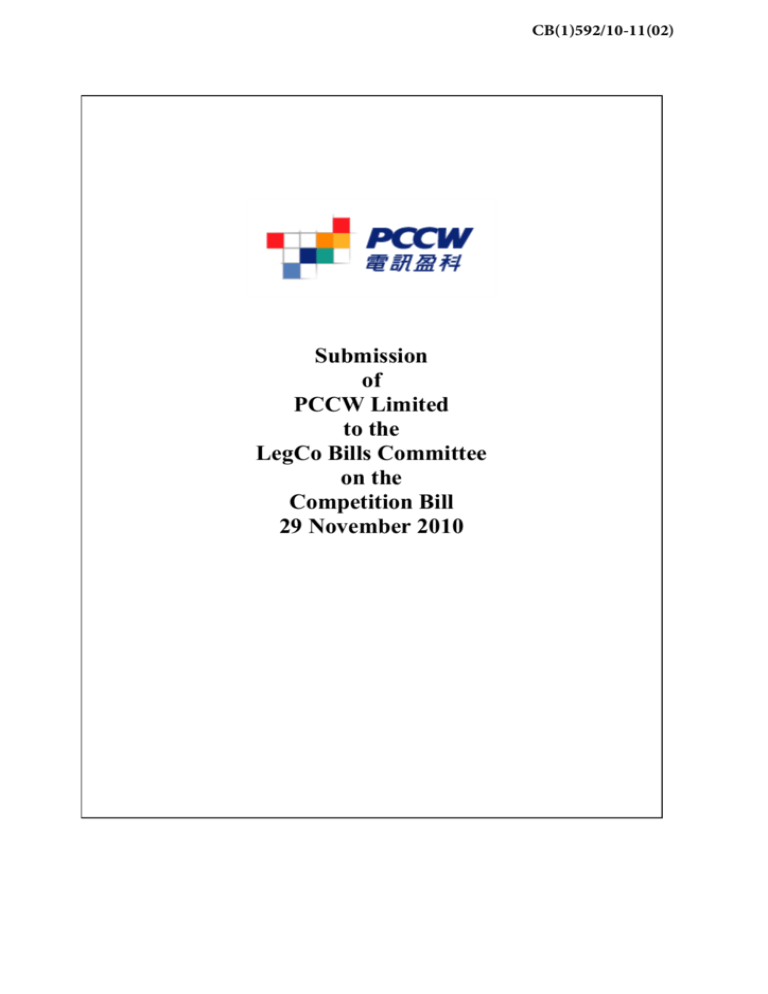
CB(1)592/10-11(02) Submission of PCCW Limited to the LegCo Bills Committee on the Competition Bill 29 November 2010 PCCW has previously indicated its support for a general competition law. Such a law can increase market efficiencies, reduce hard-core anti-competitive practices and generally benefit both businesses and consumers. However, PCCW’s support of a general competition bill is based on the view that such a bill should: (a) (b) (c) (d) Use global best practices as a starting point; Adapt such global best practices to the unique circumstances of a small and open market; Be light handed, clear/understandable and easy to implement; and Be non-discriminatory. It is our view that the current bill does not meet these criteria. The bill does not reflect global best practices, is not tailored to reflect the realities of a small and open market which prides itself on avoiding excessive and vague regulations, is overly complex, lacks definitions of key terms, and discriminates against the telecommunications sector in several important ways. The bill can and should be improved. Unsuitable for Hong Kong On one level, the bill appears to use the EU competition law as its model. Yet the EU uses competition law to ensure a single market and to promote an industrial policy agenda. Neither of these is relevant to the Hong Kong market. The bill also does not in its drafting establish tests which reflect the unique features of highly competitive and liberalized smaller economies which must ordinarily have higher concentration levels to promote economic efficiency. Indeed, the promotion of economic efficiency is a key consideration of competition law and yet is not even mentioned in the bill’s preamble. The recent reforms to the Canadian competition legislation provide a useful reference point. The Canadian law now expressly provides for efficiency gains to be balanced in any assessment of whether identified conduct should be prohibited to ensure that Canada retains its competitive position in international markets. This is obviously critical to the effective implementation of any competition law in Hong Kong, although it may not be a core issue within the EU single market. The Canadian law also prohibits the specified conduct only from the date of the decision, thus outlawing future but not past conduct. This approach has substantial attraction in the early years of the law, addresses SME concerns and acts to promote the policy goal of market education. It is important that the Hong Kong law not stifle pro-competitive conduct or undermine Hong Kong’s position as a leading commercial center. The “substantial lessening of competition” test should be used throughout the bill, not just in the mergers section. This should be done for consistency, because it is clearer than the proposed “prevent, restrict or distort” test and because it is better suited to smaller markets where a measurable impact should be a precursor to the application of the law. This language change should thus be incorporated into the first and second conduct rules. Under the second conduct rule the test should be one of “dominance” rather than the lower standard of “significant market power”. This would be consistent with the mainland AntiMonopoly Law and allow slightly higher levels of concentration, which are appropriate in smaller markets. At the same time, the test for unlawful conduct should look at the effect of the conduct in the market. Looking at the purpose of the conduct other than for penalty reasons introduces an unwelcomed element of subjectivity into a prosecution. Difficult to Understand and Implement A light handed bill which would be easy to understand and implement, especially for SMEs, would list the conduct which would run afoul of the first conduct rule. Such a listing would enhance clarity while capturing most types of unwanted conduct. This list would include price fixing, market sharing and bid rigging which the Canadian law (and most observers) have identified as the primary concern regarding anticompetitive conduct. As certainty is a pillar of the Hong Kong legal system, it would be appropriate to identify with clarity the possible offending conduct. Simplicity in the commission and tribunal processes would also be desirable. Inappropriate Discrimination of the Telecommunications Industry The bill should be non-discriminatory. It should apply to all undertakings on an equal basis. Singling out the telecoms industry, which is one of the most competitive industries in Hong Kong, for asymmetrical treatment is inappropriate. It is surprising that this principle is not embedded in the bill. Four failings arise here. First, the merger rule should apply to all sectors or to none. Second, Section 7Q of Schedule 8 on exploitative conduct should be deleted. If exploitative conduct is not within the second conduct rule which applies to all, then it should not suddenly appear and be imposed on the telecom sector. Third, concurrent jurisdiction is both unnecessary and dangerous. Unnecessary because a Commission and a Tribunal are being established. Having another body look at competition issues is not required. Dangerous because having two bodies possibly looking at essentially the same issues and conduct invites inconsistency in approaches and decisions, and adds substantially to the costs and burdens of defendants who find themselves running between the TA and the Commission, and then between the Competition Appeal Board and the Tribunal to explain and defend their actions. This is a recipe for intractable conflicts between the jurisdictions of these two bodies. There is no real reason to create such a situation. It also creates a situation where a limited body of expertise would be divided between regulatory bodies, with thus neither obtaining a critical mass expertise. Failure to meet Global Best Practices The bill does not employ global best practices for a highly competitive and developed market. The tests employed by the three conduct rules are different, section 7Q proposes an approach fully rejected by the USA and heavily criticized in the EU. More modern approaches to conduct, dominance and mergers should be adopted. The penalty provision is extreme, going beyond the EU model and as written may have the effect of encouraging businesses to exit the local market. Stand alone actions are not appropriate. Excessive litigation is the likely outcome if stand alone actions are allowed. Allowing follow on actions provide a more balanced approach. It is noted that broad stand alone actions do not represent global best practices. More modern approaches to conduct, dominance, mergers and private actions should be adopted. The Commission should also be more open to requests for ‘comfort letters’, a process in which undertakings ask the Commission if certain conduct (usually proposed agreements of some type) would be lawful. The bill unfortunately does not appear to place much importance to this process although this would be important to all undertakings trying to be more efficient and competitive who need where the conduct lines are. Leniency and the infringement notice proposals are useful but as drafted will not be effective. As currently worded, undertakings who might disclose market mis-conduct or agree to correct their conduct will still be exposed to private actions. Such an exposure will act to discourage whistle blowers and negotiated settlements, and is thus counter productive. For these sections to be effective, exposure to follow on actions must limited. It is not clear if the first conduct rule would be used to reach mergers. This should be clarified. The EU experience shows that this issue will lead to an entire area of satellite litigation which could be avoided now with clearer drafting. If the draft merger provision is intended to be discriminatory and to capture only telecoms carrier licensee mergers, then it needs to be re-drafted as it currently is much broader than the existing merger regulation in the Telecommunications Ordinance. At the same time the commission’s time frame to investigate a merger should be shortened from 6 to 3 months, and an equally short time frame created for any tribunal action. Markets do not standstill and any merger investigation must be as fast as possible. The Exclusion and Exemption approach is extremely broad, and with respect would allow Government undertakings with substantial economic activities to perhaps escape any oversight. This distorts competition by allowing some powerful undertakings to escape any oversight, and being above the law. This will be seen by both the public and the private sector as unfair and ill-advised. The draft bill can be improved and PCCW looks forward to assisting in that effort. - End -








